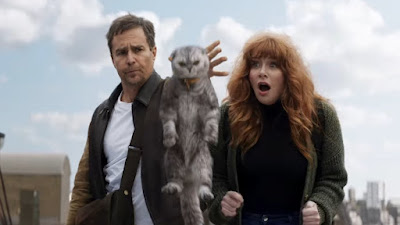(M) ★★★
Director: Matthew Vaughn.
Cast: Bryce Dallas Howard, Sam Rockwell, Bryan Cranston, Catherine O'Hara, Henry Cavill, Sofia Boutella, Dua Lipa, Ariana DeBose, John Cena, Samuel L. Jackson.
 |
| Cat bomb, deployed. |
Sometimes a tiny little thing can ruin a movie for you.
Maybe it's the casting of a particular actor, or a single plot point, or even the look of a costume or special effect. Maybe it's a single horrible line of dialogue.
In the case of Argylle, it's the use of The Beatles song Now And Then.
Firstly, I quite like this song. I adore The Beatles, perhaps more than any other band, and I got chills hearing their final single when it was released in November, 2023.
But that's the problem - it was released in November, 2023. And the characters in this film, which is presumably set in the present day (nothing tells us otherwise) say that it's their song, because it has soundtracked their life together. Which is impossible.
And for some reason, this shits me enormously. Because, let's face it, Vaughn could have chosen any one of a squillion songs released long before 2023, but instead he picked this one. It doesn't matter that it's The Beatles' Now And Then - it could have been Doja Cat's Paint The Town Red and it would have annoyed me just as much. And this incongruous decision stands out like dog's balls, dragging me (and maybe other people) out of this otherwise enjoyable film.
It's a small matter, but I really wanted to address it before pointing out that this is an otherwise solid film, very much in the vein of Vaughn's Kingsman movies. It's a hyper-stylised and occasionally absurd spy movie, with a sparkling sense of humour and snappy dialogue, delivered by a strong cast.
Yes, it gets bonkers... and then even more bonkers... and then even more bonkers again, and you are either along for the ride or not. Much like Vaughn's direction, there are no half-measures here for the audience.
Argylle is the story of Elly Conway (Howard), a shy spy novelist whose life is saved by real-life spy Aidan (Rockwell), dragging her into a world of espionage that bizarrely mirrors the plots of her books. How is this happening and who can she trust?
Howard and Rockwell are great as a kind of screwball couple bouncing from one kinetic action sequence to the next. In between, we see flashes of an under-utilised Cavill as Conway's fictional hero Argylle, while Cranston chimes in as a memorable villain.
While obviously not to all tastes, Argylle is ridiculous yet fun. It goes perilously close to jumping the shark so many times and the twists pile on awkwardly but it's half the appeal. Unfortunately it does drag on too long, as if two stories have been wedged together in fear of not getting a sequel greenlit.
Some iconic-looking sequences linger in the mind, but so does that poor song choice. In 10-20 years it will make sense, and maybe those iconic-looking sequences will actually be iconic. But for now, this overlong oddity is a flawed minor joy.
